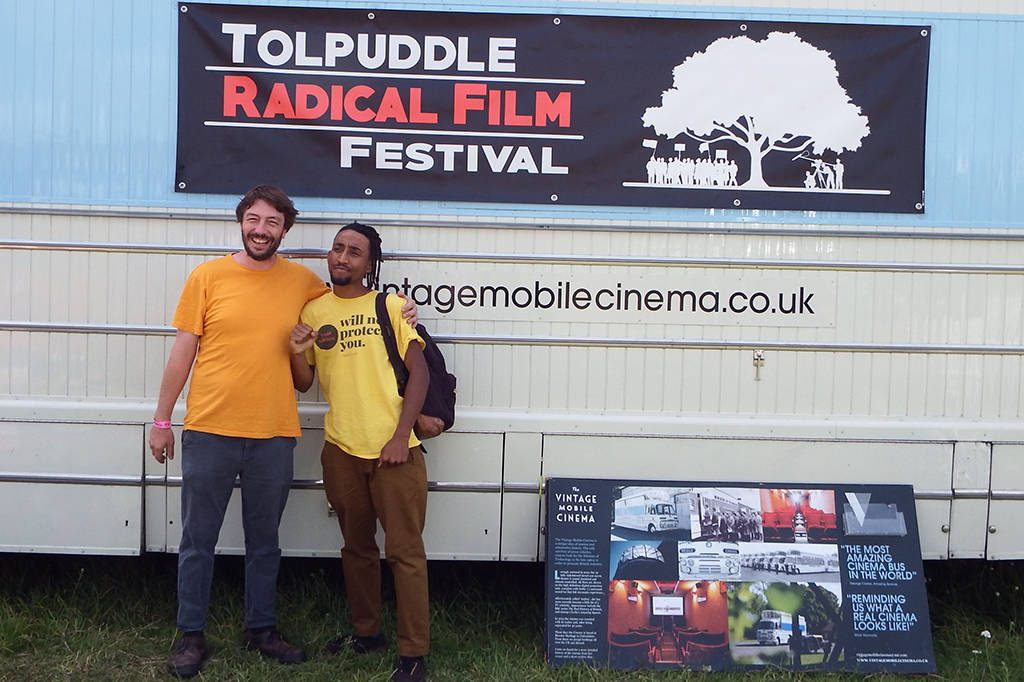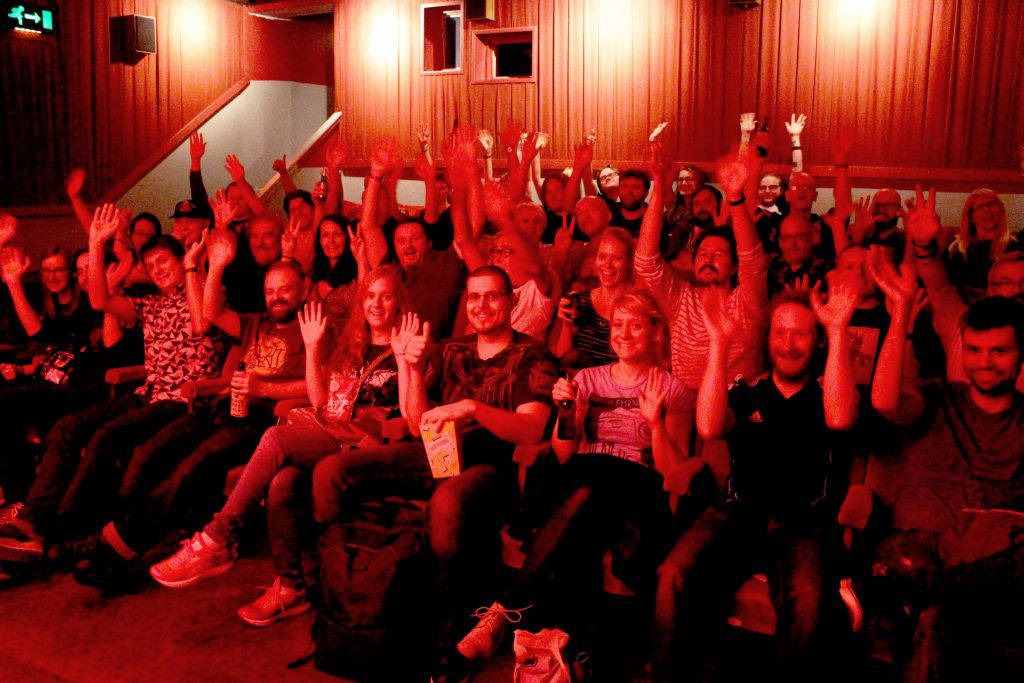Davide Abbatescianni (Cineuropa) had a chat with Steve Presence, one of the founding members of the Radical Film Network (RFN). The RFN is among the largest international organisations involved in the promotion of politically-engaged and aesthetically innovative film culture. The boundaries of what is ‘radical’ are often blurry and can describe a number of cultural practices. Nonetheless, the RFN prides itself on supporting progressive and experimental film culture and promoting social justice, equality and environmental sustainability.
The RFN’s history begins in London in 2013, when a group of activists, academics, filmmakers and festival programmers met to find new ways to develop and support radical film culture. Over the last six years, the RFN has established a number of international partnerships and regularly organises outreach activities, conferences, special screenings and other initiatives. I had the chance to speak with one of the RFN’s founding members, namely Steve Presence from the University of the West of England. Our conversation focused on the history of the RFN and its role in spreading radical film culture through their annual conferences as well as their partners’ new approaches to screenings and programming.
First of all, what are the main aims of the RFN?
There are three main aims: first, to facilitate communication and collaboration among the different facets of radical film culture; second, to build a sense of community and solidarity among those working in it; and, lastly, to raise the visibility and increase the profile of all the amazing work everyone in the network does.
How were you involved in its foundation?
The idea for the network started from an awareness that there were many groups working in this field which operate with next to no funding, often because their status as politically-committed organisations excludes them from most sources. They were doing a lot of innovative work across production, distribution and exhibition, but it was largely unsupported. It seemed like an organisation such as ours would be of benefit. I was in a good position to help start it up, having just completed a PhD on the contemporary history of British radical documentary and having co-organised a radical film festival for several years. I got a little bit of time from my university to develop it and it went from there.
How many organisations are now part of the RFN?
The RFN consists of approximately 140 organisations from 30-odd or so countries, though it is still predominantly anglophone and western-centric. We are currently working on getting our website translated and the focus of this year’s conference was on our colleagues working in the Global South.

The work of the Independent Filmmakers’ Association (IFA) left a significant legacy, I suppose…
IFA’s influence was really significant. In fact, the RFN was conceived as a sort of digital successor to the IFA, which did a lot in the 1970s and 1980s to promote and coordinate what they called ‘independent’ film and lobby for funding or support. A lot of the key people involved in the IFA are still around. Sue Clayton, Laura Mulvey, Tony Dowmunt, Rod Stoneman, Clive Myer and Sylvia Harvey are now active in the RFN, which is great. One of the most satisfying aspects about our conferences is seeing the older activists and filmmakers learning about the more recent people involved, and vice versa. That was always another reason to set the network up. There was a real generation gap where younger activists and organisations weren’t always aware of the tradition they were part of, so facilitating that relationship is another contribution the RFN has helped to make.
Could you mention a few examples of your partners’ outreach initiatives and innovative approaches to screenings or programming?
There are many. I can mention five of them. Alternative Film Video in Belgrade is running its annual festival again in December, bringing together artists and activists over five days to explore the theme of collectivism. Echo Park Film Center in Los Angeles are running analogue film workshops and exploring contemporary city symphonies. Bombozila, a radical streaming platform based in Rio de Janeiro, is holding a week-long series of events showing documentaries and sharing the story of the 43 students kidnapped five years ago in Mexico. Unicorn Riot, a video-activist collective based in Minneapolis, helped document German activists stage the direct action known as Ende Gelaende, in which thousands of climate justice activists stormed a coal infrastructure. Finally, Reel News, the London-based video-activist collective, released a series of films to support the Global Climate Strike on 20 September. You can find most of these initiatives on our directory of affiliated organisations here: radicalfilmnetwork.com/directory and check out what radical filmmakers from all over the world are doing!
All in all, the RFN is a bright example of how today it is possible to network, join forces and spread an alternative filmmaking culture that goes beyond the Westernised, privileged mainstream narrations. Gradually, the RFN is building a new group of filmmakers, scholars, exhibitors and viewers. Initiatives such as the ones previously mentioned or the upcoming Scalarama in the UK fully reflect the RFN’s will to create an open community, where screenings and programming strategies are shared and cinema is a celebration “for everyone, by everyone, everywhere”.

The RFN regularly hosts one or two annual conferences where artists, filmmakers, academics and other personalities share their knowledge and experience. In what ways do these events contribute to the development of radical film culture?
Because the RFN was set-up to operate without any funding, the infrastructure of the network is as ‘light-weight’ as possible. It’s really just the website, the mailing list and a few social media channels. There are no membership fees or application processes. The affiliation to the network is free and the website is intentionally fairly low-maintenance. Therefore, the annual conferences are fascinating opportunities where the network ‘materialises’ in a concrete way, and everyone meets up to talk, share ideas and projects, and move things forward. Each conference is organised by a different group in the network. So far, conferences have been held in Birmingham, Glasgow, New York, Tolpuddle, Dublin and Nottingham. In 2020 and 2021, we will be in Kosovo and Genoa, respectively. In terms of how they contribute to the promotion of radical film culture, I can say that each event does that in different ways. The conferences tend not to be so outward-facing, as they are really for those already involved, though each event will also have initiatives open to the public, alongside the core conference activities.
Their contribution is in terms of consolidating and growing radical film culture from the inside out, in the sense that the conferences are spaces where the global community of activists, artists and everyone in between can come together and talk among themselves rather than to their audiences. Most groups spent at least some of their time doing outreach in their communities, so it’s good to have a space where we can reflect, share and build.

If you represent or know of another organisation that would like to affiliate to the RFN, you can contact them at info@radicalfilmnetwork.com.
The RFN has also successfully promoted two of our most recent ICO tours, namely Revolt, She Said: Women and Film after ’68 and The Personal is Political – The Films of Margarethe von Trotta. The first tour, curated by the queer feminist film collective Club des Femmes, was an opportunity to share intersectional, queer and feminist stories of revolution, following the events of ’68. The second, organised in co-operation with London’s Goethe-Institut and the German Screen Studies Network, highlighted von Trotta’s outstanding work through the screening of four of her masterpieces. We’ve commissioned new writing on the influence and importance of Margarethe von Trotta from academics, curators and writers from different generations.

